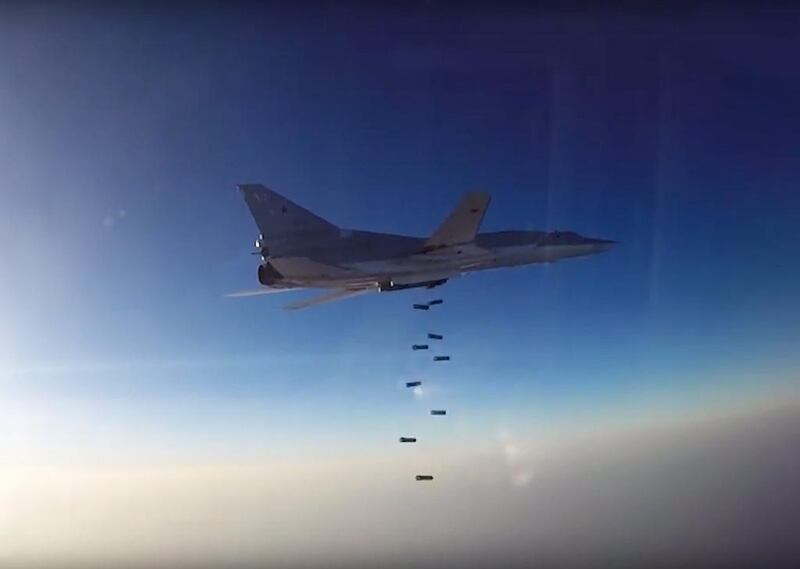BEIRUT // Russia on Tuesday started using an Iranian airbase to launch strikes on targets in Syria, further entrenching itself in the Middle East and its conflicts.
Moscow’s ministry of defence said Tupolev-22M3 long-range bombers and Sukhoi-34 tactical bombers launched missions against ISIL and Jabhat Fatah Al Sham – formerly known as Jabhat Al Nusra – on Tuesday from the Hamedan airbase in western Iran.
The ministry said the bombers struck ammunition depots, training camps and militant control centres in Syria’s Aleppo, Deir Ezzor and Idlib provinces.
Ahead of the Russian announcement, Al Masdar News, a news website regarded as supportive of the Syrian government, ran photos of the bombers on the tarmac of the Iranian base. It said Russia's Hmeymim airbase in Syria's Latakia province was not equipped to handle the large Tupolev-22M3 long-range bombers, which previously flew missions in Syria from an airbase in Mozdok, southern Russia.
Using the Iranian base will cut down flight times significantly, Al Masdar News said, adding that bombers striking areas near the city of Palmyra need to fly just 900 kilometres from Hamedan as opposed to over 2,000 kilometres from Mozdok.
The deployment of Russian jets to Iran is the latest move in Moscow’s bid to widen its footprint in the Middle East and deepen its influence. In less than a year, Russia has gone from a very limited military presence in the Middle East to having the use of two airbases and emerging as a major military power in the fractured region.
Russia intervened militarily in Syria last September, backing the government of Syrian president Bashar Al Assad. In addition to establishing the Hmeymim airbase and providing troops and air power to the government’s war effort, Russia has deployed an S-400 anti-aircraft system to Syria. The missile system, which was installed at Hmeymim, is capable of reaching targets across all of Syria, Lebanon and Cyprus and significant parts of Israel, Jordan and southern Turkey.
Meanwhile Turkey, which amid increasing frustration with its US and European allies recently patched up relations with Moscow, has said it would be willing to cooperate militarily with Russia against ISIL in Syria.
Iran has also been heavily invested in Syria’s war, deploying fighters and military advisers while also supplying weapons and other aid to the Syrian government. Shiite militias backed by Iran, such as Hizbollah, have also played a major role in backing the Syrian regime.
However, the decision to host Russian forces is a major shift for Iran. Since radical Shiite clerics took control of the country in the 1979 revolution, Tehran has not allowed any foreign states to use its territory for military operations, although it has been active in hosting and training proxy military forces.
“Tehran-Moscow cooperation in the fight against terrorism in Syria is strategic and we exchange capacities and potentialities in this field,” said Ali Shamkhani, secretary of Iran’s supreme national security council, according to Iran’s state-run Press TV. “As a result of the constructive and extended cooperation among Iran, Russia, Syria and the resistance front, the situation has become very tough for terrorists and this process will continue with the beginning of a new extended operation until their annihilation.”
Russia’s announcement that its air force is now launching strikes from Iran came a day after the Russian defence minister, Sergei Shoigu, said Moscow and the United States were “close” to starting joint operations against militants in Aleppo. Shortly after, however, US state department spokeswoman Elizabeth Trudeau said Washington had “nothing to announce at this time” regarding increased military cooperation with Russia in Syria.
Joint US-Russian action against the then Al Qaeda affiliate, Jabhat Al Nusra, was actively discussed in recent months, although such conversations seem to have died down as of late amid Al Nusra dropping its Al Qaeda moniker and changing its name, Syrian rebels breaking a government siege in Aleppo and international criticism of Russia’s heavy-handed air strikes against rebel-held areas of Syria.
Now, Russia’s turn to Iran – a country that is hostile to the US and an openly sectarian ally of Syria’s government – could further complicate efforts to cooperate militarily with Washington.
jwood@thenational.ae





